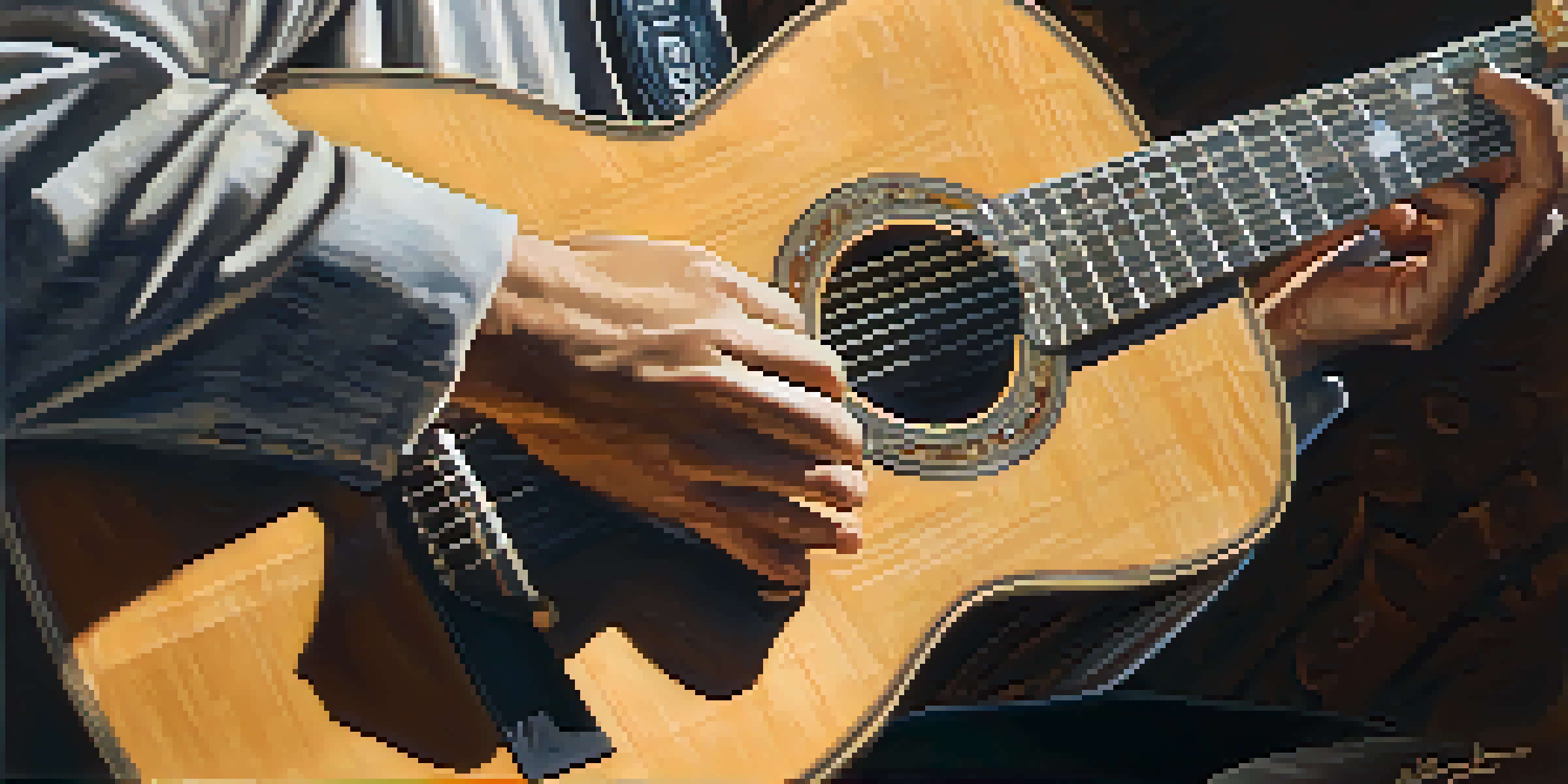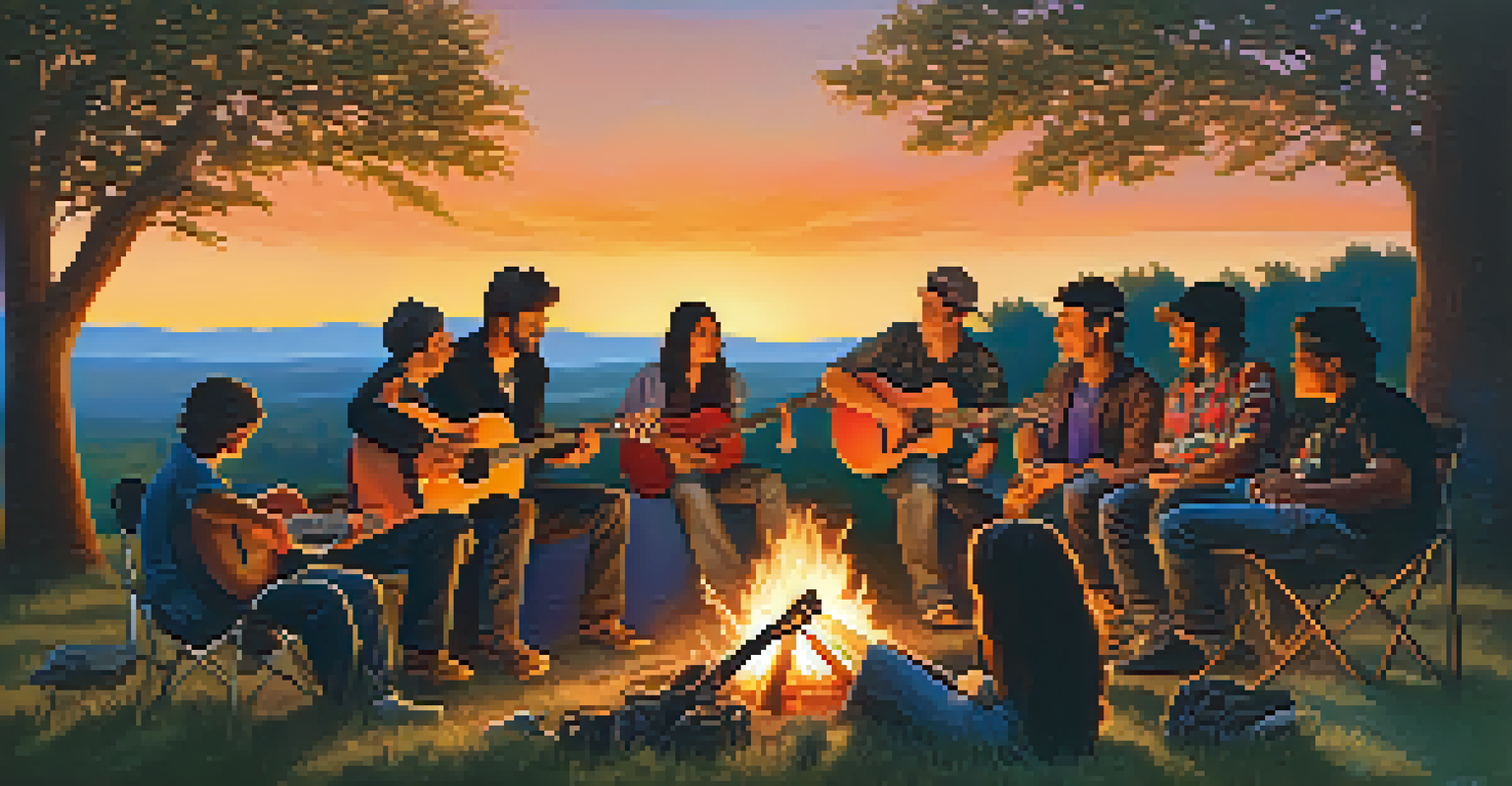The Connection Between Guitar Playing and Personal Identity

How Guitar Playing Shapes Our Self-Expression
Guitar playing serves as a powerful medium for self-expression, allowing individuals to convey their emotions and experiences. When strumming chords or crafting melodies, musicians often share stories that resonate deeply with their listeners. This act of creation not only reflects personal feelings but also helps players process their thoughts and emotions.
Music is the shorthand of emotion.
For many, the guitar becomes an extension of their personality, showcasing their unique style and tastes. Whether it's through the choice of genres, techniques, or even the type of guitar used, each player's sound tells a story about who they are. This connection between the instrument and the musician fosters a sense of identity that is both personal and communal.
Moreover, the way one plays can evolve alongside their personal journey. As life experiences shape our perspectives, the music we create can shift, revealing new facets of our identity. This evolving nature of guitar playing exemplifies how art can be a mirror reflecting our growth and changes.
Cultural Influences and Guitar Identity
Cultural background plays a significant role in shaping how guitarists identify themselves and their music. Different regions and communities have distinct musical traditions that influence the styles and genres musicians gravitate towards. For example, a guitarist raised in a flamenco-rich environment may find their identity intertwined with passionate rhythms and intricate fingerpicking techniques.

This connection to culture not only informs musical style but also fosters a sense of belonging. Guitarists often feel a kinship with others who share similar backgrounds, leading to collaborations and community-building. These connections can enhance one's sense of identity, as players engage in cultural exchanges through music.
Guitar as Self-Expression Tool
Playing guitar allows individuals to convey emotions and experiences, reflecting personal stories through music.
Furthermore, as globalization brings diverse musical influences together, guitarists can explore and blend styles from different cultures. This melting pot of sounds allows individuals to create a unique musical identity that reflects their diverse experiences, ultimately enriching their personal journey.
The Role of Community in Shaping Guitar Identity
The guitar community plays an essential role in shaping individual identities among musicians. From local jam sessions to online forums, these spaces provide opportunities for players to connect, share, and learn from one another. Engaging with fellow guitarists fosters a sense of camaraderie and belonging, reinforcing one's identity as a musician.
The guitar is a miniature orchestra in itself.
Collaboration and feedback from peers can significantly influence a guitarist's style and approach. When surrounded by others who share a passion for music, players often feel encouraged to experiment with their sound and push their boundaries. This collaborative spirit can lead to a deeper understanding of oneself and one's music.
Moreover, community events like open mics and festivals allow guitarists to showcase their talents and receive recognition. This public affirmation not only boosts confidence but also solidifies their identity within the musical landscape. As players navigate these spaces, they continually evolve, embracing their unique journey in the world of guitar.
Personal Growth Through Guitar Playing
Guitar playing often parallels personal growth, serving as a vehicle for self-discovery. As individuals learn new techniques and songs, they also develop patience, discipline, and resilience. These qualities not only enhance musical skills but also contribute to personal identity, shaping how one perceives challenges in life.
The journey of mastering the guitar can be filled with ups and downs, mirroring the struggles we face in other areas of life. Each accomplishment, whether learning a new chord or performing in front of an audience, builds confidence and reinforces a sense of identity. This ongoing process of growth is deeply intertwined with the act of making music.
Cultural Influence on Identity
A guitarist's cultural background shapes their musical style and fosters a sense of belonging within the community.
Additionally, the reflective nature of playing the guitar encourages introspection. Musicians often find themselves contemplating their emotions and experiences while playing, leading to a deeper understanding of their identity. This therapeutic aspect of music can be a significant factor in personal development and self-acceptance.
The Influence of Genre on Guitar Identity
Different music genres can shape a guitarist's identity in profound ways. From rock to blues to classical, each genre carries its own set of techniques, styles, and cultural significance. Guitarists often feel a connection to the genre that resonates with their personal experiences, influencing how they express themselves through music.
For instance, a guitarist immersed in punk rock might embrace a bold, rebellious identity, while a classical guitarist may cultivate an aura of sophistication and discipline. These genre-specific identities can influence how musicians interact with others and how they present themselves in different social contexts.
Moreover, as musicians explore various genres, they may find themselves blending influences, creating a hybrid identity that reflects their diverse tastes. This cross-genre exploration not only broadens their musical palette but also enriches their personal identity, showcasing the multifaceted nature of being a guitarist.
Guitar as a Tool for Identity Exploration
For many, the guitar serves as a tool for exploring different aspects of their identity. As players experiment with various styles and techniques, they may discover new interests and passions that they didn't know existed. This journey of exploration can lead to a deeper understanding of oneself and one's place in the world.
The process of songwriting, in particular, becomes a way to delve into personal narratives and reflect on life experiences. By writing and playing their own music, guitarists can articulate their thoughts and feelings in a way that feels authentic. This creative outlet not only enhances their musical skills but also contributes to a richer sense of identity.
Community Shapes Musical Growth
Engaging with fellow musicians enhances identity and fosters collaboration, leading to personal and musical evolution.
Additionally, the guitar can be a gateway to understanding broader themes, such as societal issues or personal struggles. Musicians often use their platform to raise awareness or express solidarity, allowing their music to become a reflection of their values and beliefs. In doing so, they reinforce their identity as both artists and individuals.
The Lasting Impact of Guitar Playing on Identity
The impact of guitar playing on personal identity can be long-lasting, shaping individuals well beyond their musical journey. As players continue to grow and evolve, the lessons learned through music often carry over into their everyday lives. Skills like perseverance, creativity, and collaboration become integral parts of their identity, influencing how they navigate the world.
Moreover, the connections forged through guitar playing can lead to lifelong friendships and collaborations, creating a network of support and inspiration. These relationships often enhance one's sense of belonging and identity, reinforcing the idea that music is a communal experience.

In essence, the guitar becomes more than just an instrument; it transforms into a lifelong companion that accompanies players through various stages of life. As they reflect on their journey, guitarists often recognize how their experiences with music have profoundly shaped who they are, creating a lasting legacy in their personal narrative.